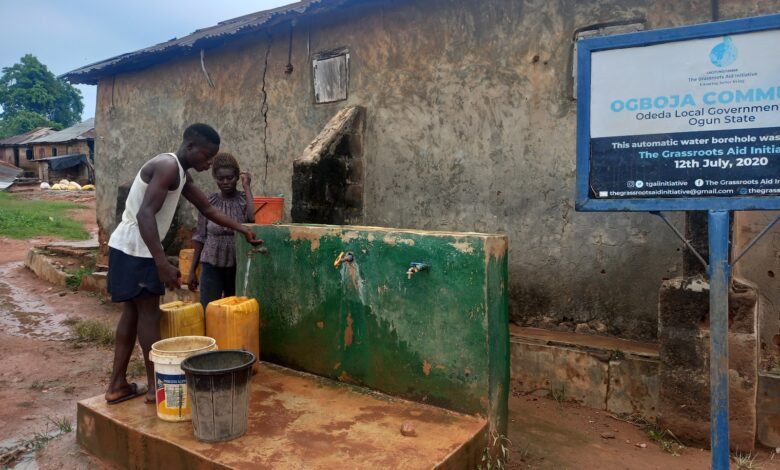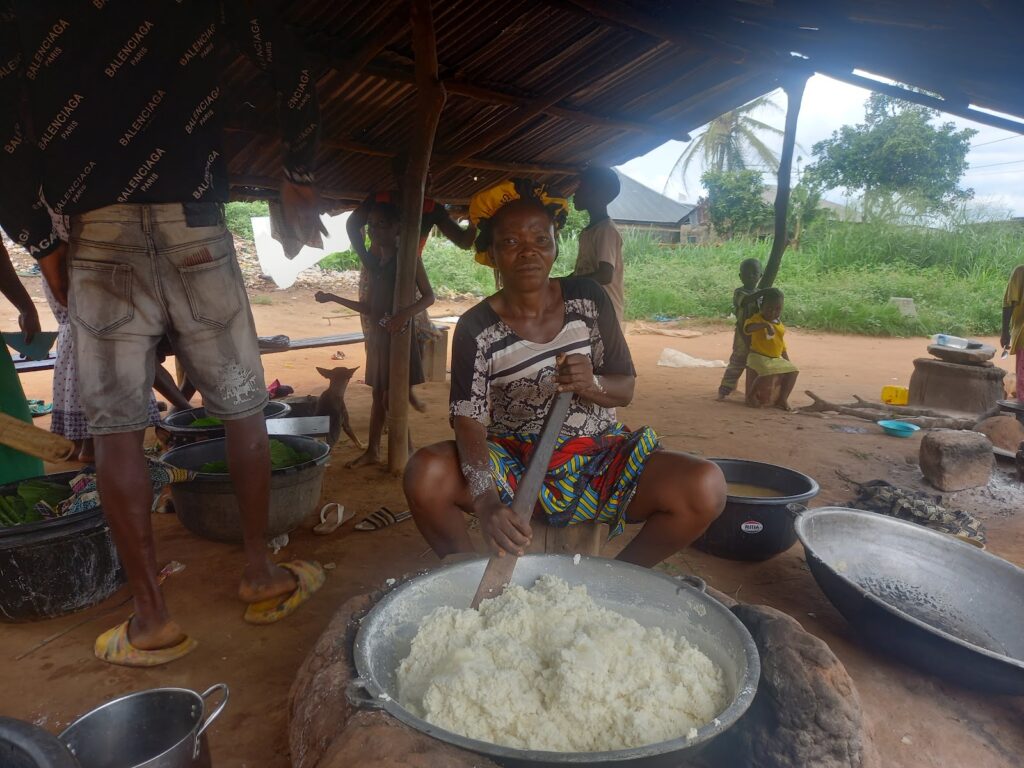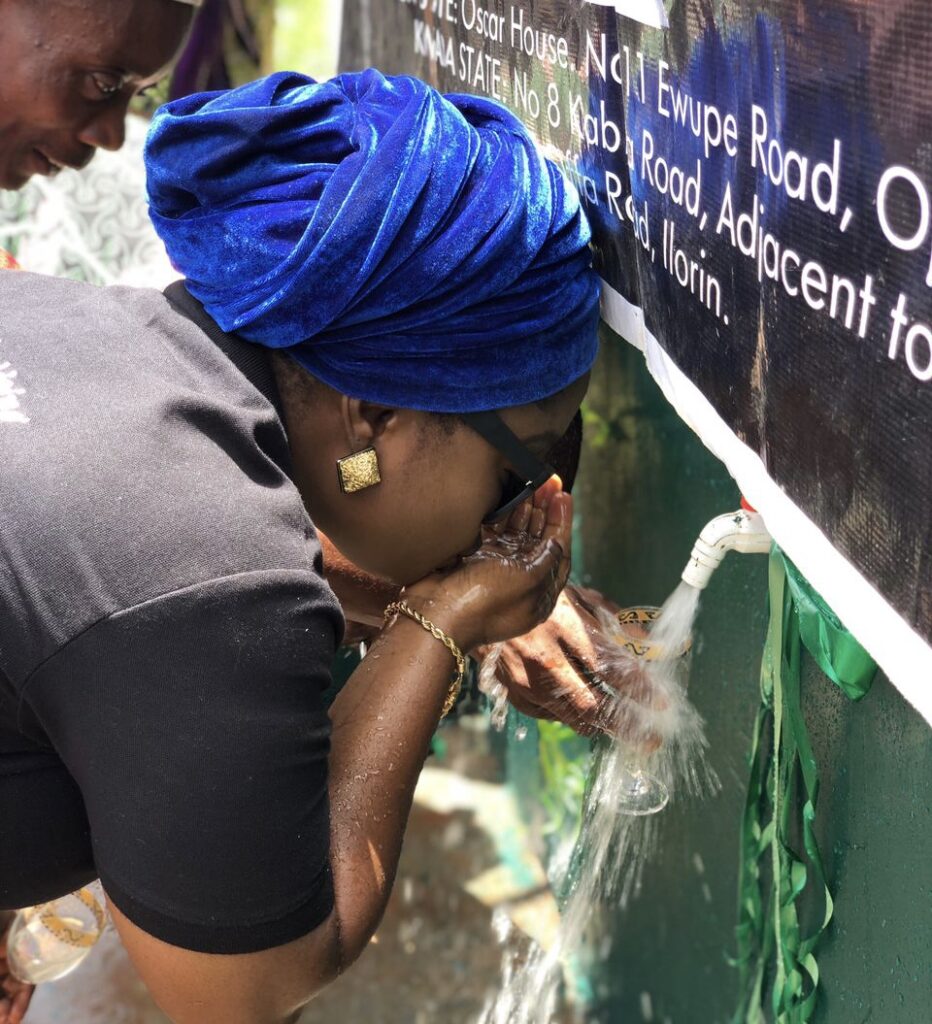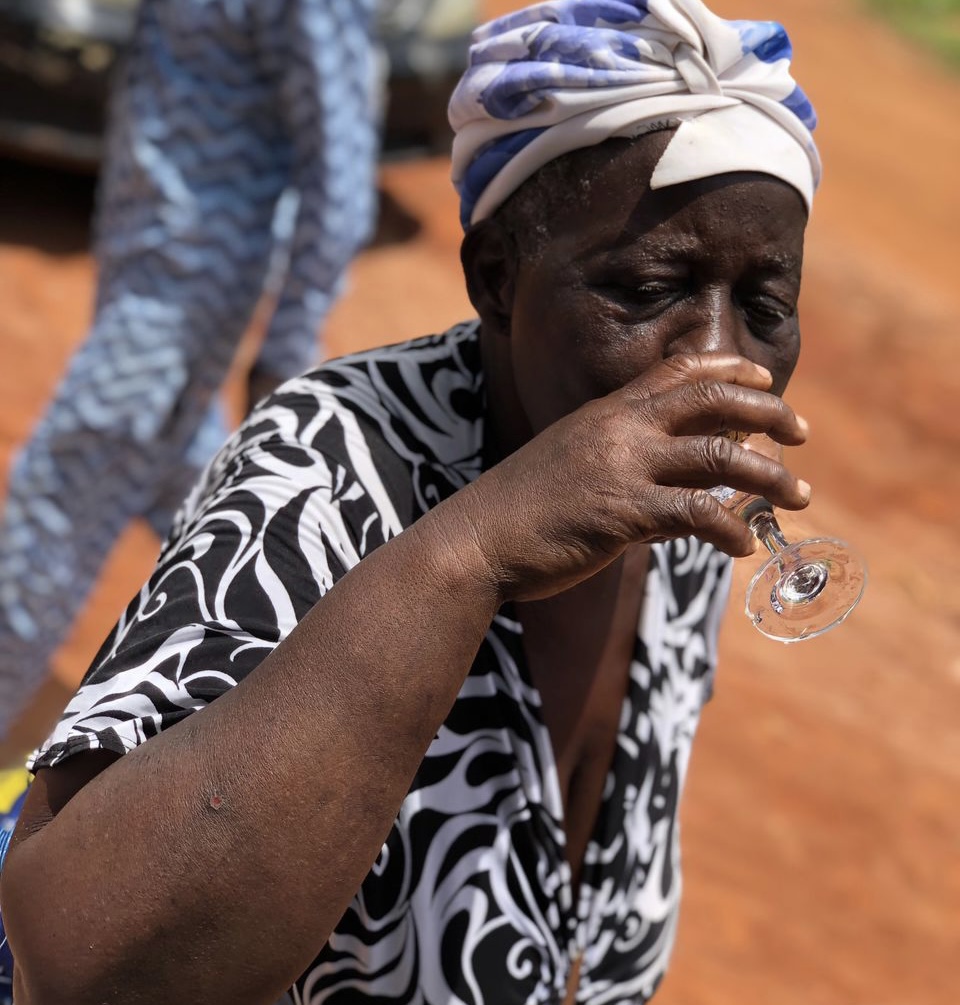
Kemi Gbereogun, 52, scowls as she stirs dough into Fufu, a staple made from cassava, over a fire. She is becoming restless. It has been over two hours since her children left for the stream and they are not yet back.
“This water issue will one day end us because I don’t know where they [the children] went to fetch water,” she laments.
Kemi lives in Akinleye, a remote community in Ogun State, Southwest Nigeria that has suffered water scarcity for years.
“Even this work I do requires lots of water,” she states, laughing hysterically in frustration.
“We are suffering. The kids have gone in search of water, and I’m only praying it won’t be an exercise in futility. Most of the time, the kids do not even take their bath before going to school.”
Kemi relies on water vendors. This puts a financial strain on her small business. A gallon of water goes for N100. “If I have another business, I would have left this one. It is tiring.”

Water scarcity is not uncommon in many parts of the world. In Nigeria, safe and potable drinking water remains a luxury, especially in rural communities like Akinleye.
Nigeria is said to be making some progress in improving access to water, sanitation and hygiene to its population, with 70 per cent of the population having access to basic drinking water. However, the quantity and quality of water for individual use is lower than the required standard.
The average quantity of water each person receives in Nigeria is nine litres per day. The minimum acceptable range is between 12 litres and 16 litres per day, according to national standards. A report released in 2019 by the Federal Ministry of Water Resources and the United Nations Children’s Fund (UNICEF), said that about 60 million Nigerians or 33 per cent of the population, do not have access to clean water.
Changing the narrative
Kadiri Kadijat noticed the trend in rural communities in Kwara State. In 2017, the senior lecturer at the Department of Mass Communication, University of Ilorin, started The Grassroots Aid Initiative (TGAI), a nonprofit that uses photography to raise awareness on the difficulties people in rural parts of the country face getting safe water.
“There is nothing we can do without water,” she says. “And when I talk about water, we are not talking about good water; we are looking at safe water that’s healthy for everyone. And these communities are not asking for what is far above their reach – for good roads or electricity. They are mostly into cassava or locust beans businesses. So, water, for them, is non-negotiable.”
Ogboja, another rural community in Ogun State, suffered the same problem. Residents relied on a stream flowing through the heart of the community. In 2020, when the nonprofit visited the community which stretches behind the Federal University of Agriculture, Abeokuta (FUNAAB) for a needs assessment, Risikat Adeosi was unmoved. The community had experienced unfulfilled promises before now.
“When they came and started taking photos, saying they wanted to give us water, I laughed it off. This is not the first time they [not TGAI] would come to the village, and take our photos, only to disappear into thin air,” she recalls, stating that she told herself the nonprofit would not check back.
“When they met with the baale (Village head), I was sure they would not come back like those before them.”
However, it dawned on the 72-year-old, when the organisation brought workers to the village and set to drilling the ground for water that they meant business. Now, a year after, Adeosi steals a look at the running tap and beams. “When the tap ran for the first time, our joy knew no bounds. And since then, the tap has not had any faults.”

Esther Adewusi, another resident of Ogboja, holds a similar opinion as Adeosi. She says the water reduces the strain that comes with walking long distances to get some for her garri business.
“I’ve not had any reason to go far since the water was constructed for us. It does not change colour like the water we were used to. The only thing on our own part is to contribute money to power the generator that comes with it. Since then, we have been fetching water anytime we wish,” she points out.
The power of a click
“Pictures can be used to tell powerful stories. It can be used to make people happy,” Kadiri begins.
Her flair for photography started while she was in Malaysia for her doctorate degree in 2012. When she came back to Nigeria and resumed at the University, it did not quickly occur to her the kind of stories to tell with her newfound love until she started a photojournalism course.
Kadiri connected with like minds on social media. “I didn’t really know the stories to use pictures to tell. When I started taking the course, the very first day I was surprised at what photography can be used to do.”
One day in 2017, she proposed a photo exhibition exercise to her 200 level students. And they all gladly signed up for it. “I told my students we had to do an exhibition. And this was something I’ve never done before. I’ve never been part of it before as a committee. But I just knew I wanted to do this thing. How I would do it, I did not know. So I started making inquiries online and offline, asking people about it.”
The exercise birthed The Grassroots Aid Initiative.
Kadiri and her students started with a village in Afon, Asa Local Government Area (LGA) of Kwara State, North-central Nigeria. Bolstered by six volunteers and a digital camera, they went to the communities and started taking pictures, documenting their lives.
“What we wanted to use the pictures for was simply to tell people what is happening in rural settings.
“I wanted to buzz my audience on Facebook and Instagram with stories of how deprived these communities were, and how they were overcoming their challenges,” she tells HumAngle.
In most of these trips, she said they all complained about the long-standing crisis of water scarcity in their communities. And the nonprofit took it upon itself to bring to the fore this difficulty.
One of the pictures caught her audiences’ attention. It was that of women, scooping water laced with brownish particles in Ago-oja village, Kwara State. “People reached out and donated to have a borehole in the community,” she recalled, stating that the water project commenced on May 20, 2017, and was commissioned seven days after.

So far, the nonprofit has provided motorised boreholes in 15 communities across Kwara, Ogun, Oyo, and Lagos states, through crowdfunding. Then it audits the cost of implementing projects on its social media handles.
“Photography helps bring stories to life,” says Kunle Olawoyin, a development communication specialist. He adds that, “it has the power to inspire many people and could lead to a change for the better. In pursuit of social justice, images could speak louder than words. While presenting evidence to promote social justice, the words or text may not be enough and photographs add great value to the evidence. To demonstrate how changes happen, the images of the before and after make the story real, verifiable and believable.”
Challenges ahead
It has not been without hiccups for the five years it has been running. Being a woman-led initiative in a highly patriarchal society like Nigeria comes at a price, Kadiri says. “There are times when men make passes because we want them to donate, or take you for a ride because you’re a woman. I’ve heard talks like ‘there is nothing I can do’, it’s demoralising. But that’s always been my launching pad.”
Crowdfunding is not a reliable source of revenue, either. The nonprofit relies on donations from the public. According to Kadiri, it takes longer before a water project is completed when targeted funds are not met.
Jolayomi Sarah is one of the nonprofit’s team of over 50 volunteers. A student of Mass communication, University of Ilorin, she says working with the team brought her closer to the world. “I got to see how people who literally live from hand to mouth suffer getting water to go about their lives. It was touching. Looking at it now, I’m glad I’m part of the team.”
This story was produced in partnership with Nigeria Health Watch through the Solutions Journalism Network, a nonprofit organisation dedicated to rigorous and compelling reporting about responses to social problems.
Support Our Journalism
There are millions of ordinary people affected by conflict in Africa whose stories are missing in the mainstream media. HumAngle is determined to tell those challenging and under-reported stories, hoping that the people impacted by these conflicts will find the safety and security they deserve.
To ensure that we continue to provide public service coverage, we have a small favour to ask you. We want you to be part of our journalistic endeavour by contributing a token to us.
Your donation will further promote a robust, free, and independent media.
Donate HereStay Closer To The Stories That Matter




